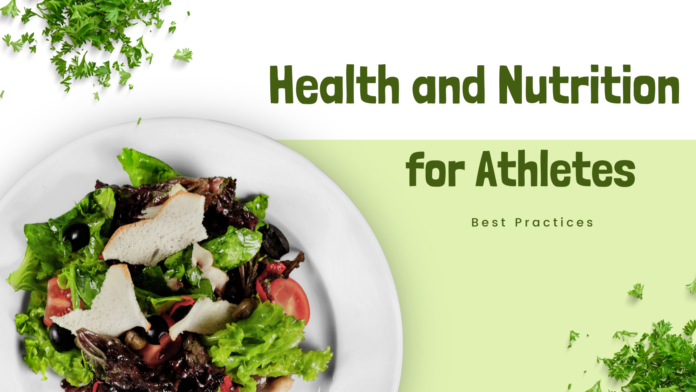Introduction
The saying “you are what you eat” is more relevant in the novel world of sports. Professional and amateur athletes equally believe that their excellence in the field, court, or track is directly related to nutrition intake and health status. Proper health and nutrition are not supplementary features in an athlete’s training regimen but form the core basis of any performance.
The following article points to the best health and nutrition practices for an athlete to help him make his choices intelligently, factoring in how he can optimize his training, recovery, and performance.
An individual will then understand the basics of nutrition in athletes.
Macronutrients: The Building Blocks
Carbohydrates, proteins, and fats are the three main macronutrients that become the concern in the diet for an athlete.
Carbohydrate: Conventional wisdom’s number one source of energy for the body, carbohydrates take center stage in the athlete’s diet. Carbohydrates fuel both anaerobic and aerobic efforts and restore glycogen stores in muscles and the liver. Complex carbohydrates such as whole grains, fruits, and vegetables should be ingested.
Proteins: These help build and repair muscles. The emphasis should be on high-quality protein sources, which include lean meats, dairy products, legumes, and nuts. There is also an element of timing in protein intake; for example, protein post-workout will enhance recovery.
Fats: Healthy fats come from avocados, nuts, and olive oil; these are crucial as they form the base for hormone production and absorb fat-soluble nutrients. However, athletes should be cautious about fat consumption, as its high caloric density can affect the overall energy balance.
Micronutrients: The Unsung Heroes
Even though vitamins and minerals are needed in much smaller amounts, they are nevertheless critical to many bodily functions, which range from immunity to energy production, even to muscle contraction. The important micronutrients among them for athletes are the following:
Iron: This is responsible for carrying oxygen in the blood.
Important, but for bone health, it contains calcium and Vitamin D.
Antioxidants-Vitamins C and E: These help in fighting off the oxidative stress emanating from hard work.
Hydration: The Key to Peak Performance
Among the most important issues of health and nutrition in sports involves hydration. Dehydration impairs performance, increases levels of fatigue, and may predispose one to injuries. In this regard, an athlete should:
Hydrate Adequately: The general recommendation, taking into consideration the amount of fluids from foods, is to consume at least 3.7 liters for men and 2.7 liters for women of total water intake in a day.
Monitoring Hydration Status: Athletes can monitor their hydration status simply by observing the color of their urine and monitoring their weight before and after training.
Consider Electrolytes: A drink with electrolytes will help replace the lost minerals during an extended or very heavy exercise regime.
Meanwhile: Feeding the Body to Succeed
Timing of meals is one of the most identified aspects – both positive and negative-that relate to an athlete’s performance and recovery. Factors include:
Pre-Workout Nutrition: This is a very important meal that should be consumed 2-3 hours prior to training, with a balanced amount of nutrition consisting of carbohydrates and protein. This helps the body to provide enough energy and also to prevent muscle breakdown.
Post-Workout Nutrition: A mix of carbohydrates and protein within 30 minutes post-workout can help assist in recovery. Carb-to-protein ratio should be 3:1 for this meal.
Meal and Snack Frequency: In general, the athlete should strive for 5-6 small meals during the day to help maintain energy levels and support metabolic function.
Special Dietary Considerations
Athletes may follow various diet patterns on the basis of their personal preferences, ethical considerations, and health issues. Some of these diets which are popularly followed by athletes and may prove beneficial for them include:
Plant-Based Diet: These diets are increasingly popular; a well-planned plant-based diet nutritionally meets all needs. Plant-based diets are also rich in antioxidants and anti-inflammatory compounds that promote recovery.
Ketogenic Diet: Some athletes try the so-called ketogenic diet in order to enhance fat oxidation. This kind of diet is not advisable in every sport, though; rather, it is specifically applicable in sports that do not require high-intensity outputs.
Gluten-Free Diet: These diets are imperative for people with celiac disease, but athletes around the world use it only in terms of reducing inflammation or to have good gut health.
Supplements: Do They Help?
Whereas an adequate diet would normally be enough to cover all nutritional needs, athletes often find supplements necessary either to fill a nutritional gap or enhance performance levels. Common supplements include:
Protein Powders: Useful for athletes who cannot reach protein requirements due to food intake.
Creatine: it’s believed to increase strength and power in sports because of the reasons mentioned earlier.
BCAAs: Branched-Chain Amino Acids-said to help reduce muscle soreness and help in recovery.
It would instead be easier to recommend that athletes consult their doctor before starting any supplement to help them in using the supplement healthily.
Rest and Recovery: The Missing Link
Nutrition is only one piece of the puzzle. Adequate rest and recovery also play an important role in health and performance for the athlete. Key strategies include: Sleep: Emphasize 7-9 hours of quality sleep each night, which will help in recovery and cognitive function.
The active recovery can be made through the light-intensity activities that involve blood flow, such as light walks and yoga.
Listen to your body: An athlete can listen to his or her body and provide himself or herself a great deal of rest whenever required.
Mental Health and Nutrition
Thus, performance is usually compromised by extreme stresses, and mental health eventually plays a major role in it. Nutrition also has an impact on a person’s mood and cognitive abilities. Some of the foods termed as “brain food” can improve mood and reduce anxiety as it contains right amounts of omega-3 fatty acids, whole grains, and plenty of fruits and vegetables.
Conclusion
In a nutshell, health and nutrition are the core foundation on which an athlete runs. Knowing what macronutrient and micronutrient classes are, proper hydration, timing of meals, and individual food preferences will further an athlete in their performance. Additionally, recovery-oriented mindsets, supplementation, and mental health will go further to improve training. These best practices create a trickling effect that does not only boost athletic performance but also provides further avenues for living a healthier lifestyle.
FAQs
Good sources of carbohydrate are:
Excellent sources of the complex carbohydrates include whole grains, fruits, vegetables, and legumes.
How many grams of protein should an athlete take in daily?
Amounts of protein usually required are about 1.2 to 2.0 grams per kilogram of body weight, depending on the intensity of training.
Is supplementation necessary or important among athletes?
Also, food supplements are helpful, but they are no replacement for good nutrition. Always consult a healthcare professional before using any dietary supplements.
How are all of those athletes going to hydrate?
It also recommends that “athletes drink water throughout the day and check the color of their urine to determine their hydration level.”.
What is the role of meal timing in athletic performance?
Proper meal timing, especially pre- and post-workout, can make a lot of difference in energy levels, performance, and recovery.
Is a plant-based diet adequate to support athletic performance?
Yes, an appropriately planned plant-based diet can provide all essential nutrients and support athletic performance.
What are the signs of dehydration in athletes?
Symptoms may appear as dark-colored urine, fatigue, dizziness, or even dry mouth.
How many hours of sleep do athletes need?
Most athletes should center their attention on sleeping 7-9 hours every night to help in recovery.
Do carbs help with recovery?
Yes, restoring glycogen after a hard workout with carbohydrate sources is important.
What are some good post-exercise snacks?
A combination of protein and carbohydrates, such as protein shake mixed with a banana or Greek yogurt with berries.
Is it okay for an athlete to eat fast food?
An occasional meal of fast food is unlikely to cause harm, but it has no place as a regular feature of an athlete’s diet.
How do lipids impact athletic performance?
They are rich in essential fatty acids. Therefore, healthy fats bear an extremely valuable significance in view of producing hormones and supplying energy during long-duration activities.
How does one best recover after exercise?
Incorporate hydration, proper nutrition, and rest to support your recovery, too.
How do antioxidants help athletes?
Antioxidants help fight against oxidative stress and inflammation that usually occur as a result of intense training.
Is a ketogenic diet an option for athletes?
Some will be able to take advantage of this, but not all sports are recommended for this type, especially those that run in spurts.
What is the optimal ratio of carbohydrates to protein following exercise? As the name suggests, this is most commonly prescribed in a ratio of 3:1 carbohydrates to protein. How do athletes improve their mental health? Improved mental health may be sustained by nutrition, regular exercise, sufficient rest, and seeking professional support. Should Athletes Eat Before Morning Workouts? It can give some energy; however, the timing of a light snack and the amount eaten varies with personal preference and tolerance. How do the athletes manage diets during the competition? They may continue by sticking to foods they know and live with, knowing such will work for their bodies and maintain proper hydration. What will be the outcomes of poor nutrition for a sportsman? Poor nutrition can lead to suboptimal performance, increased injury risk, and long-term consequences for health.









































